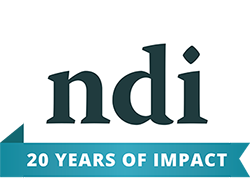By Anil Lewis, Executive Director of the National Federation of the Blind Jernigan Institute
As one of four children (three of whom eventually became blind) to a widowed mother who relocated seven times in seven years during a struggle to escape the plight of the inner city, I can tell many stories about poverty and adversity.
Interestingly enough, these stories would not be ones of pity; they would be of privilege, because I believe that power can be acquired from poverty, and awesomeness from adversity.
I count it as privilege that I learned to be happy without, to take joy in the simple things and value my self-worth above all else. Because we were not able to afford expensive things, I learned to appreciate the functional and placed great importance on the intangible. Growing up, I was taught to value strength of character, personal integrity and respect of others regardless of their situation or lot in life. Although I have also learned to appreciate the fantastic, I can still enjoy a slice of SPAM as well as filet mignon, and actually prefer potted meat on my cracker over caviar.
I could have wasted a lot of time measuring my life against the lives of others. Choosing to wonder, “Why do others have a better house, car, or clothes? Why does someone else have better health, look better or is more popular?” Luckily, I realized that my life does not improve as a result of comparing what I have to what others have. I believe I must use myself as the benchmark, and continue to work on becoming a better me.
I am blessed that I acquired this perspective before the onset of my blindness. I am doubly blessed that I discovered the National Federation of the Blind, an organization of and for blind people that helped me refine this perspective in relationship to my blindness.
I realize that my blindness, just like the color of my skin and my economic standing, is a characteristic that describes me, but does not define me. These characteristics are neither negative nor positive. They simply offer a means to describe facets of my existence. It is up to me to define how they impact my life. Unfortunately, far too often, members of society, including people with disabilities, erroneously attribute absence of capacity and lack of value to the characteristic of disability.
The strategy I use to establish a positive self-worth regardless of societal stereotypes around race and socio-economic status is the same strategy I used to maintain my positive self-worth as a person who is blind. It is a very simple strategy. At various milestone moments in my life, I evaluate my environment and the people in my inner circle. Then, I ask myself, is this where you want to be? Are these the people you want to be associated with? If my answer is yes, then I am thankful, and acknowledge that I am in a good place so that the moment is not taken for granted. If not, I make the conscious decision to change my life so that I am working to be where, and with whom, I want to be.
Of course, some things may not work out the way I planned, so I develop a new plan. Some label this fierce determination, but it is simply the recognition that it is much more fun trying than giving up. Moreover, the fun I have while trying opens up so many more opportunities and makes the journey so much more enjoyable. I believe that with appreciation for the simple things, determination toward self-improvement, a commitment to full participation and a little luck, I can live the life I want.
ABOUT THE AUTHOR
Anil Lewis was born in Atlanta, Georgia in 1964, and became blind from retinitis pigmentosa, a retinal degenerative eye disease, in 1989, before receiving his bachelors of business administration in computer information systems at Georgia State University (GSU). He received his master’s degree in public administration with emphasis in policy analysis and program evaluation from GSU in 2003. Currently, he serves as the Executive Director of the National Federation of the Blind Jernigan Institute.



